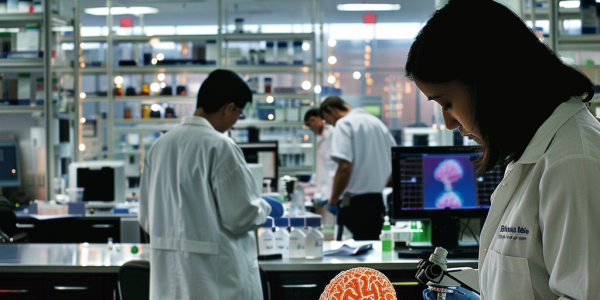Wearable Tech and Machine Learning Transform Fall Risk Prediction in Parkinson’s Patients
A groundbreaking study from the University of Oxford reveals how wearable sensor technology and machine learning can predict fall risk in Parkinson’s disease patients. This innovative approach analyzes walking patterns and postural sway over five years, offering a more objective method for fall risk assessment. With over half of Parkinson’s patients experiencing falls, this research paves the way for personalized interventions, enhancing safety and quality of life for individuals living with this condition.
Breakthrough Study Reveals Nilotinib’s Potential to Reverse Dementia Symptoms
A groundbreaking study reveals that nilotinib, a drug primarily used for blood cancer, may significantly slow down or even reverse dementia, particularly Lewy body dementia and Parkinson’s disease-related dementia. Recent trials show promising results, enhancing cognitive function and improving quality of life for patients. This advancement offers hope to the millions affected by dementia and highlights the importance of continued research in developing effective treatments.
Innovative Non-Invasive Drug Delivery System for Parkinson’s Disease
Discover a groundbreaking non-invasive oral drug delivery system for Parkinson’s disease management. This innovative approach allows for continuous administration of levodopa-carbidopa, enhancing patient comfort and treatment efficacy. Learn how this technology addresses medication challenges and improves quality of life for individuals with chronic conditions.
Sunbird Bio Unveils Groundbreaking Blood Test for Parkinson’s Disease with 86% Accuracy
Sunbird Bio has unveiled a groundbreaking blood test for Parkinson’s disease, achieving an 86% accuracy rate. Presented at the CTAD conference in Madrid, this innovative diagnostic tool utilizes aggregated alpha-synuclein proteins to improve early detection of Parkinson’s, addressing a significant gap in neurological diagnostics. This advancement could revolutionize patient care and pave the way for identifying other neurological disorders like Alzheimer’s.
Vocal Changes May Signal Early Detection of Parkinson’s Disease
Recent research reveals that vocal changes may serve as an early indicator of Parkinson’s disease, potentially allowing for earlier diagnosis and intervention. Conducted by neuroscientists at the University of Arizona, the study highlights the connection between vocal symptoms and the alpha-synuclein gene, suggesting that monitoring voice alterations could revolutionize Parkinson’s detection and treatment strategies.
Beloved Baywatch Actor Michael Newman Passes Away at 68
Michael Newman, beloved actor known for his role as Mike ‘Newmie’ Newman on Baywatch, has passed away at 68 after battling Parkinson’s Disease for 18 years. His legacy as a talented performer and dedicated community servant will be remembered by fans and colleagues alike. Newman’s authentic portrayal of Newmie, based on his real-life experiences, made him a household name. Tributes pour in as the entertainment industry honors his significant impact and inspiring journey.
Study Reveals Ophthalmic Acid as Potential Alternative to Dopamine for Parkinson’s Treatment
A groundbreaking study from UC Irvine reveals that ophthalmic acid may be a viable alternative to dopamine for regulating motor functions, offering new therapeutic strategies for Parkinson’s disease. Published in the journal Brain, the research shows that ophthalmic acid can reverse motor impairments in mouse models for over 20 hours, challenging the notion that dopamine is the sole neurotransmitter responsible for motor control. This discovery could pave the way for innovative treatments for Parkinson’s and other movement disorders.
New Research Uncovers Metabolic Disruptions in Parkinson’s Disease
Recent research from Fujita Health University reveals significant metabolic disruptions in Parkinson’s disease, particularly in purine metabolism and ATP recycling. The study highlights lower uric acid levels in PD patients, suggesting a complex relationship influenced by factors like sex and age. These findings pave the way for innovative therapeutic strategies aimed at enhancing energy metabolism, potentially improving the quality of life for those affected by Parkinson’s disease.
Health Innovations and Community Initiatives: A Look at Recent Developments
Discover groundbreaking advancements in early diagnosis of Parkinson’s disease, exploring innovative biomarkers and imaging techniques that promise to change patient outcomes. Learn about the benefits and potential drawbacks of fitness trackers, the cultural impact of La Nica Mini Market in Lake Charles, and the Legislative Black Caucus’s focus on equitable state laws. Additionally, find out how the SWLA Hospice Center is providing vital support to families in need during end-of-life challenges.
Lario Therapeutics Secures $6 Million Grant for Parkinson’s Disease Research
Lario Therapeutics secures $6 million funding from The Michael J. Fox Foundation to advance research on Parkinson’s disease. This grant will support the company’s preclinical program focused on CaV2.3 calcium channel inhibition, aiming to develop innovative treatments for millions affected by this neurodegenerative disorder.










